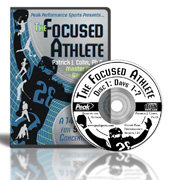
How does spectator behavior affect your focus?
Why do some athletes feed off the crowd while other athletes lose focus?
Crowd noise can be a massive distraction in sports competitions. Whether it’s cheering, booing, taunting, or hurling insults, the crowd’s impact can be significant.
The people sitting in the stands can only influence the outcome of a competition without even being on the playing field if you let them. Performing at your peak despite rowdy fans comes down to managing your focus and emotions.
Once you start noticing the crowd noise, your focus is diverted away from performing the task at hand. Some athletes who feed off the crowd become overexcited when the crowd is pumped up. They feel the heavy weight of expectations to win.
These athletes struggle to regulate their excitement, ditch their game plans, and try to do too much to please the fans.
On the flip side, some athletes who focus on the crowd noise become fearful of embarrassing themselves, making mistakes, and losing by a significant margin.
These athletes become overwhelmed by the moment, anxious, and have difficulty regaining their focus. In both instances, focusing on the crowd noise, an external distraction, leads to unproductive emotions and underperformance.
An effective way to overcome external distractions is to focus inward. Internal focus is when you direct your attention towards the movement of your body or on bodily sensations, such as breathing or relaxing your muscles.
Since you cannot focus on internal and external stimuli simultaneously, focusing inward minimizes the impact of crowd noise. In the 1,500-meter track event at the 2024 Olympics, the crowd noise was deafening.
Much anticipation revolved around the race between two of the best runners in the world: Jakob Ingebrigtsen, the defending Olympic champion, and Josh Kerr, the reigning world champion.
However, USA runner Cole Hocker pulled off the upset by bettering his personal best by nearly 3 seconds and setting an Olympic record in the process.
After the race, Hocker commented on the 80,000 screaming fans in the arena and the top runners in the field.
HOCKER: “It was a deafening noise. I’ve never heard that in a stadium before. I kind of lost feeling in my body, and it didn’t feel like the Olympics anymore until it did… [Ingebrigtsen and Kerr] had all this added pressure and all that and noise. I think that’s part of this. This job is blocking out that noise and it gets harder and harder the more you excel.”
When you focus on your game plan or your breathing, you reduce the impact of the crowd and foster peak performance. It is important to remember that focus is a choice that you have complete control over.
Knowing you have control over your focus is empowering and leads to more robust athletic confidence.
Deep breathing is a quick and easy refocusing strategy. Intentional, conscious breathing helps ground you in the present moment and slows down the body’s stress response.
This will relax your muscles, enhances fluid mechanics, and enables better decision-making.
Related Sports Psychology Article
- How to Deal with External Noise
- Leaving a Positive Legacy for Athletes
- How Top Athletes Improve Focus
The Focused Athlete (Digital Download)

“The Focused Athlete” audio and workbook program helps you or your athletes overcome distractions and sharpen your concentration during competition. You learn how to get locked in during practice and competition so you can improve and perform better.
“First, I would like to thank you for the help given to me through your programs, ‘The Confident Athlete’ and ‘The Focused Athlete.’ I have made tremendous sacrifices though all these years to become a top Olympic Trap shooter but something was missing. This missing part was with my mental game. My scores increased tremendously in record time and others said that I was a different shooter.“
~Marios Kapodistria
